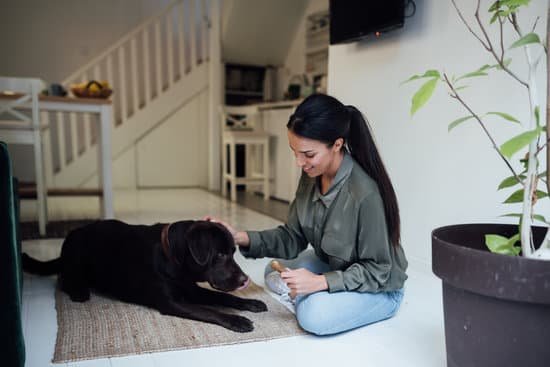Are you interested in learning how to train your dog to be a therapy dog in the UK? Therapy dogs play a vital role in providing comfort, companionship, and support to various individuals in different settings. In this article, we will explore the process of training a therapy dog, the benefits of having a therapy dog in the UK, and the necessary qualities and characteristics of a good therapy dog.
Therapy dogs are not only beloved companions but also essential members of many communities in the UK. They bring joy and comfort to people in hospitals, nursing homes, schools, and other facilities. If you’re eager to learn about how to train your dog to become a certified therapy dog and make a positive impact on others’ lives, read on.
In addition to shedding light on training techniques, we will discuss finding the right training program for your furry companion and guide you through the assessment and certification process for therapy dogs in the UK. We’ll also provide valuable tips for maintaining a successful therapy dog practice once your canine partner is ready to start their journey as a certified therapy dog.
Whether you’re considering embarking on this rewarding venture or simply want to learn more about therapy dogs, this article will provide you with all the information you need.
Benefits of Having a Therapy Dog in the UK
There are numerous benefits to having a therapy dog in the UK, both for the individual owner and the community as a whole. Therapy dogs can make a significant impact on people’s mental and emotional well-being, as well as provide comfort and support in various settings such as hospitals, nursing homes, schools, and disaster areas.
Some of the key benefits of having a therapy dog in the UK include:
- Emotional Support: Therapy dogs can offer emotional support to individuals struggling with stress, anxiety, depression, or other mental health issues.
- Physical Health: Interacting with therapy dogs has been shown to lower blood pressure, reduce pain perception, and release endorphins that contribute to overall well-being.
- Social Interaction: Therapy dogs can help facilitate social interaction among people who may be isolated or struggling with communication skills.
Additionally, therapy dogs have been proven to bring joy and comfort to those going through difficult times. In healthcare settings, they can provide a much-needed distraction for patients undergoing medical treatments or recovering from illness. In educational environments, therapy dogs can help students feel more relaxed and focused while learning.
Finally, having a therapy dog in the UK allows owners to give back to their community by sharing the unconditional love and companionship of their furry friends with those in need. The positive impact that therapy dogs have on individuals and society illustrates just how valuable they are in various settings across the UK.
Qualities and Characteristics of a Good Therapy Dog
When it comes to training a dog to be a therapy dog in the UK, it is important to understand the qualities and characteristics that are essential for a successful therapy dog. One of the most important qualities of a good therapy dog is a calm and gentle demeanor. Therapy dogs need to remain calm and relaxed in various environments and around different people, so having a naturally calm temperament is crucial.
Another important characteristic of a good therapy dog is sociability. They should be friendly, outgoing, and enjoy being around people. Therapy dogs often interact with individuals who may be experiencing emotional or physical distress, so being able to provide comfort and companionship is vital.
Furthermore, obedience is key for a successful therapy dog. They should have basic obedience skills such as sit, stay, come, and walking on a loose leash. Having good manners in public settings is also important for therapy dogs, as they will be interacting with various individuals in different environments as part of their role.
Overall, a good therapy dog should possess the qualities of calmness, sociability, and obedience. These characteristics will contribute to their success in providing comfort and support to those in need within the UK community.
Finding the Right Training Program in the UK
Finding the right training program is crucial when it comes to preparing your dog to become a therapy dog in the UK. There are many different training programs and facilities available, so it’s important to do your research and find the one that best suits your dog’s needs and your own personal preferences.
Researching Training Programs
Start by researching different training programs in your area. Look for programs that have experience specifically with therapy dog training, as this requires a different skill set than standard obedience training. You can ask for recommendations from other therapy dog handlers or speak to local animal shelters or veterinary clinics for suggestions.
Visiting Potential Training Facilities
Once you’ve identified a few potential training programs, schedule visits to each facility. This will give you an opportunity to see the environment where your dog will be trained and interact with the trainers. Take note of the methods they use, the cleanliness of the facility, and how they address any concerns or questions you may have.
Choosing the Right Fit
Ultimately, choosing the right training program for your therapy dog is a personal decision. Consider factors such as location, cost, and the rapport between your dog and the trainer. It’s important to feel comfortable with the program you choose, as this will make the training process more enjoyable for both you and your dog. Always remember that finding a reputable and experienced program is key to setting your therapy dog up for success in their future role.
Basic Obedience Training for Therapy Dogs
Basic obedience training is an essential foundation for any dog, especially those being trained to become therapy dogs. In the UK, therapy dogs are expected to have a high level of obedience and responsiveness to their handler’s commands. This type of training focuses on teaching the dog basic commands such as sit, stay, come, and heel. It also involves leash training to ensure that the dog can walk calmly and politely in different environments.
A well-trained therapy dog is a joy to work with and is more likely to be accepted into therapy programs in the UK. Basic obedience training not only provides the necessary skills for a dog to be well-behaved in public settings but also establishes a strong bond between the handler and the dog. The process of learning and practicing basic obedience commands helps build trust and communication between the two, which is crucial in therapy work.
In addition to responding to verbal commands, therapy dogs in the UK must also be proficient in responding to hand signals from their handlers. This adds an extra layer of communication and control when working with clients who may have hearing impairments or other special needs. Overall, basic obedience training sets the groundwork for a successful therapy dog practice in the UK.
| Therapy Dog Training Requirements | UK Standards |
|---|---|
| Basic Commands (Sit, Stay, Come, Heel) | Required |
| Leash Training | Required |
| Response to Hand Signals | Required |
Socialization and Desensitization Training
Introduction to Socialization and Desensitization Training
Socialization and desensitization training are crucial components in preparing a dog to become a therapy dog. The purpose of socialization training is to expose the dog to different people, environments, sounds, and experiences in order to develop their comfort and confidence in various situations. Desensitization training involves gradually exposing the dog to stimuli that may cause fear or anxiety in a controlled and positive manner.
Methods for Socialization and Desensitizing Therapy Dogs
One of the most effective ways to socialize and desensitize a therapy dog is through positive reinforcement training. This involves rewarding the dog with treats, praise, or toys when they exhibit calm and confident behavior in new or potentially stressful situations. Exposure to various environments such as hospitals, nursing homes, schools, and public spaces is also essential for therapy dogs to become familiar with different settings.
Challenges and Considerations for Socialization and Desensitization Training
It’s important for trainers to be patient and understanding during the socialization and desensitization process as each dog will progress at their own pace. Some dogs may be naturally more reserved or anxious, requiring extra time and effort to acclimate them to new experiences. Additionally, trainers should be mindful of any potential triggers that may cause stress or fear in therapy dogs, working gradually on exposure while ensuring the dog feels safe throughout the process.
Advanced Training for Therapy Dogs
Once a therapy dog has mastered basic obedience and socialization, it is important to provide them with advanced training to ensure they can handle the various environments and situations they may encounter while on duty. Here are some advanced training techniques that can help prepare a therapy dog for their role:
1. Public Access Training: This type of training focuses on teaching the therapy dog how to behave appropriately in different public settings such as hospitals, schools, or nursing homes. It includes practicing walking through crowded areas, ignoring distractions, and being comfortable around wheelchairs or medical equipment.
2. Task-Specific Training: Depending on the specific role of the therapy dog, they may need to learn task-specific skills such as providing comfort to individuals with PTSD, assisting with physical therapy exercises, or alerting to medical emergencies. This advanced training should be tailored to the specific needs of the population the dog will be working with.
3. Canine Good Citizen Test: Many therapy dog organizations require dogs to pass the Canine Good Citizen (CGC) test as part of their certification process. This test evaluates a dog’s ability to demonstrate good manners in everyday situations and is an important step in preparing a therapy dog for their work.
By providing advanced training for therapy dogs, handlers can ensure that their canine companions are well-prepared and equipped to provide support and comfort to those in need throughout the UK.
Assessment and Certification Process for Therapy Dogs in the UK
The assessment and certification process for therapy dogs in the UK is an essential step to ensure that the dog is well-equipped to provide comfort and support to those in need. The process involves a series of tests and evaluations to assess the dog’s temperament, behavior, and obedience. This helps to determine if the dog has the right qualities and characteristics to become a certified therapy dog.
One of the key components of the assessment process is the evaluation of the dog’s socialization skills. The dog must be able to interact positively with a variety of people, including strangers, children, and elderly individuals. Additionally, the dog should be comfortable in different environments, such as hospitals, nursing homes, schools, and other public settings where therapy visits may occur.
In addition to socialization skills, therapy dogs are also assessed on their obedience and basic training. They should be able to follow commands such as sit, stay, come, and heel. Furthermore, they should be well-behaved on a leash and have good manners when interacting with others.
Once a therapy dog successfully completes these assessments, they can then proceed to become certified through reputable organizations that adhere to standards set by Therapy Dogs International (TDI) or The Kennel Club Good Citizen Dog Scheme. These certifications are crucial for ensuring that therapy dogs meet certain criteria and are fit for their important role in providing emotional support in various settings throughout the UK.
How to Get Involved in Therapy Dog Programs and Organizations in the UK
Getting involved in therapy dog programs and organizations in the UK can be a rewarding experience for both you and your dog. There are several ways to get involved, whether it’s through volunteering with an existing organization or starting your own therapy dog program.
One way to get involved is to volunteer with a local therapy dog organization. These organizations often have established programs in place and are always in need of volunteers to help with various activities such as visiting hospitals, nursing homes, schools, and other facilities. Contacting these organizations directly can help you find out how you and your dog can become part of their program.
Another option is to start your own therapy dog program. This may involve creating a plan for how you want to use your dog for therapy work, obtaining the necessary certifications and training, and reaching out to potential facilities that may benefit from visits by a therapy dog team. Starting your own program can be more challenging but also incredibly rewarding as you have full control over the activities and impact of your therapy dog work.
You can also get involved by participating in events or workshops related to therapy dogs. These events are a great opportunity to learn more about the world of therapy dogs, network with other handlers and organizations, and gain valuable insights into what it takes to become an active member of the therapy dog community in the UK.
| Ways to Get Involved | Details |
|---|---|
| Volunteer with a local organization | Contact existing organizations and inquire about volunteer opportunities |
| Start your own program | Create a plan, obtain necessary certifications, reach out to potential facilities |
| Participate in events or workshops | Attend events to learn more about the world of therapy dogs and network with others |
Tips for Maintaining a Successful Therapy Dog Practice in the UK
In conclusion, training your dog to be a therapy dog in the UK can be a rewarding and fulfilling experience for both you and your canine companion. By understanding the benefits of having a therapy dog, the qualities and characteristics of a good therapy dog, and finding the right training program in the UK, you can set yourself up for success in this rewarding field.
Once your therapy dog is trained and certified, it is important to maintain a successful practice. This includes regular visits to the facilities or organizations you have partnered with, ongoing obedience training to ensure your dog’s behavior remains exemplary, and staying updated on any new developments or techniques in the field of animal-assisted therapy.
Furthermore, it’s crucial to take care of your therapy dog’s physical and emotional well-being by providing regular exercise, mental stimulation, healthy nutrition, and plenty of love and affection. Lastly, being involved in therapy dog programs and organizations in the UK can provide valuable support, resources, and networking opportunities as you continue your journey in using your beloved canine companion to make a positive impact on others’ lives.
With dedication and perseverance, you can maintain a successful therapy dog practice in the UK while bringing joy and comfort to those in need.
Frequently Asked Questions
How Long Does It Take to Train a Dog to Be a Therapy Dog?
Training a dog to be a therapy dog can take anywhere from a few months to over a year, depending on the individual dog and the amount of time spent on training. The process typically involves obedience training, socialization, exposure to different environments and situations, as well as specific testing and evaluations.
Can You Train Your Dog to Be a Therapy Dog at Home?
Yes, it is possible to train your dog to be a therapy dog at home with dedication, patience, and proper resources. While professional help may be beneficial, there are online resources, books, and classes available for owners who want to train their own therapy dogs.
It’s important to follow guidelines and requirements set by therapy dog organizations in order to ensure that your dog is adequately prepared.
What Is the Good Citizen Dog Scheme?
The Good Citizen Dog Scheme is a program in the UK that promotes responsible dog ownership through various levels of training and testing. The scheme assesses dogs in different areas such as basic obedience, social behavior in public spaces, and owner responsibility. It aims to encourage well-behaved and sociable dogs within the community.

Welcome to the blog! I am a professional dog trainer and have been working with dogs for many years. In this blog, I will be discussing various topics related to dog training, including tips, tricks, and advice. I hope you find this information helpful and informative. Thanks for reading!





